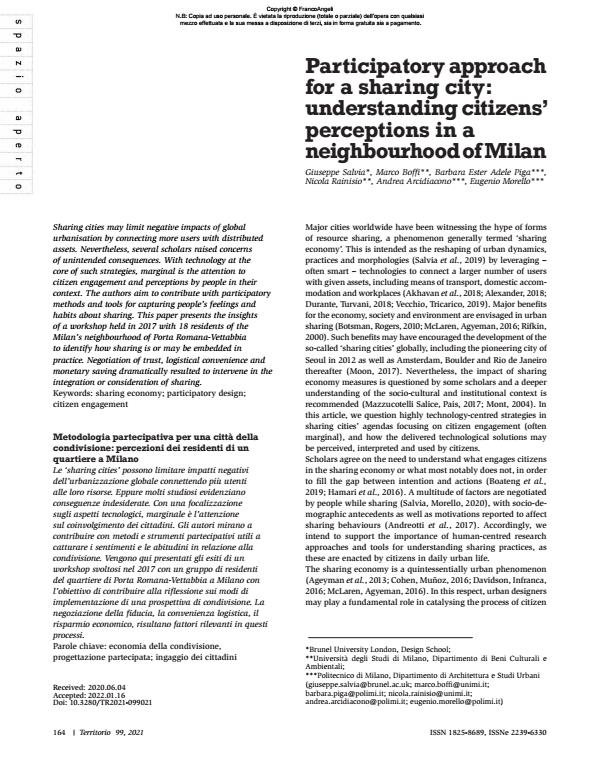Participatory approach for a sharing city: understanding citizens’ perceptions in a neighbourhood of Milan
Titolo Rivista TERRITORIO
Autori/Curatori Giuseppe Salvia, Marco Boffi, Barbara Ester Adele Piga, Nicola Rainisio, Andrea Arcidiacono, Eugenio Morello
Anno di pubblicazione 2022 Fascicolo 2021/99
Lingua Inglese Numero pagine 15 P. 164-178 Dimensione file 2044 KB
DOI 10.3280/TR2021-099021
Il DOI è il codice a barre della proprietà intellettuale: per saperne di più
clicca qui
Qui sotto puoi vedere in anteprima la prima pagina di questo articolo.
Se questo articolo ti interessa, lo puoi acquistare (e scaricare in formato pdf) seguendo le facili indicazioni per acquistare il download credit. Acquista Download Credits per scaricare questo Articolo in formato PDF

FrancoAngeli è membro della Publishers International Linking Association, Inc (PILA)associazione indipendente e non profit per facilitare (attraverso i servizi tecnologici implementati da CrossRef.org) l’accesso degli studiosi ai contenuti digitali nelle pubblicazioni professionali e scientifiche
Sharing cities may limit negative impacts of global urbanisation by connecting more users with distributed assets. Nevertheless, several scholars raised concerns of unintended consequences. With technology at the core of such strategies, marginal is the attention to citizen engagement and perceptions by people in their context. The authors aim to contribute with participatory methods and tools for capturing people’s feelings and habits about sharing. This paper presents the insights of a workshop held in 2017 with 18 residents of the Milan’s neighbourhood of Porta Romana-Vettabbia to identify how sharing is or may be embedded in practice. Negotiation of trust, logistical convenience and monetary saving dramatically resulted to intervene in the integration or consideration of sharing.
Le ‘sharing cities’ possono limitare impatti negativi dell’urbanizzazione globale connettendo più utenti alle loro risorse. Eppure molti studiosi evidenziano conseguenze indesiderate. Con una focalizzazione sugli aspetti tecnologici, marginale è l’attenzione sul coinvolgimento dei cittadini. Gli autori mirano a contribuire con metodi e strumenti partecipativi utili a catturare i sentimenti e le abitudini in relazione alla condivisione. Vengono qui presentati gli esiti di un workshop svoltosi nel 2017 con un gruppo di residenti del quartiere di Porta Romana-Vettabbia a Milano con l’obiettivo di contribuire alla riflessione sui modi di implementazione di una prospettiva di condivisione. La negoziazione della fiducia, la convenienza logistica, il risparmio economico, risultano fattori rilevanti in questi processi.
Parole chiave:economia della condivisione, progettazione partecipata; ingaggio dei cittadini
- Improving the Quality of Life and Sustainability for Middle-Class Mass Housing MUGE AKKAR ERCAN, CLAUS BECH-DANIELSEN, HASSAN ESTAJI, ROBERTO GOYCOOLEA-PRADO, BERNARD HAUMONT, BYRON IOANNOU, LORA NICOLAOU, PAZ NUÑEZ-MARTÍ, SANJIN SUBIC, in Docomomo Journal /2023 pp.65
DOI: 10.52200/docomomo.68.07
Giuseppe Salvia, Marco Boffi, Barbara Ester Adele Piga, Nicola Rainisio, Andrea Arcidiacono, Eugenio Morello, Participatory approach for a sharing city: understanding citizens’ perceptions in a neighbourhood of Milan in "TERRITORIO" 99/2021, pp 164-178, DOI: 10.3280/TR2021-099021